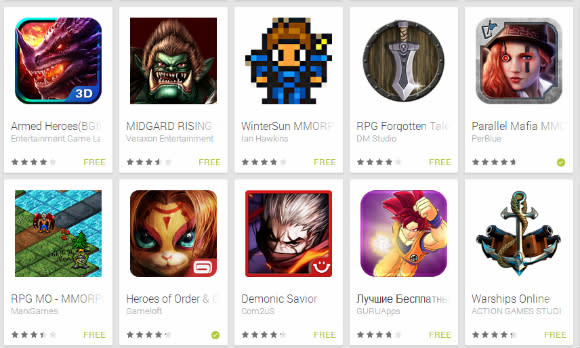MMObility: Exploring the confusing world of mobile MMOs
The mobile MMO market has sort of come to a standstill, at least in the Western market. There are always new or incoming mobile titles that are MMO-like and even a handful of new fully fledged MMOs, but most of the ones I come across are either relative copies of current games or blatant repeats of current designs. There's just not much that is new coming to the table right now. It's a bit depressing because mobile devices are perfect delivery systems for massively multiplayer gaming, and yet so many developers are cutting down standard MMO design to fit into the mobile world.
What I would like to suggest is a rethinking of MMOs for mobile. I'd like to see developers stop with the idea that mobile players are gaming the same way they do on a console or PC. Instead, I'd like to suggest that developers get to know how players interact with mobile devices and how that affects how and how long they play. Mobile MMOs should behave differently, but not so differently that they are no longer MMOs.
There are many different types of games you will find when you search for "MMORPG" on Google Play or the App market. Most of them are not MMORPGs, however.

First we have standard "real" MMOs, games that feature a real, open world and real-time interaction between avatars. The stand-out in this genre is Arcane Legends and the other titles from the Legends franchise. We can also check out Order and Chaos Online and other, more primitive-looking titles like The World of Magic.
Next we can flip through location-based MMOs. These are games that use the mobile platform's ability to locate us almost anywhere in the world. Games like Ingress or Life is Magic overlay the game world on the real world. This is quite possibly the most unique, promising, and interesting sub-genre of the mobile market but has yet to live up to its promise. The problem with most of the games in this genre is that they often count on other players or population densities to make the game happen, leaving those of us who do not live within the immediate limits of a major city out in the cold. Location-based gaming needs to act as standard MMOs and offer plenty of solo content that does not depend on other players and multiplayer content when one player comes into contact with another, all balanced within a real-time world.
While I would consider the MMORTS a part of the standard MMO experience because it has the real-time, massive, and persistent experience that our favorite client-based MMORPGs do, most of the MMORTS titles I have been finding on the mobile market are hardly MMOs. They are often "multiplayer" in the way they offer a way to attack or defend against other computer-controlled players, but they don't do much for those of us who want a real, persistent experience. The ironic thing is that the city-building RTS is one of the easiest games to translate to a mobile MMO because its graphics can be simple without taking away the epic nature of the gameplay.
Lastly, there are the scores of games that call themselves "MMORPGs" while barely being even MMO-like. I dislike the fact that both the iOS and Android markets do nothing to enforce the MMO categorization. It reminds me of how fantasy books are often placed in the same category as science fiction or horror, as though geeks for one would be geeks for all. Most of my time on the mobile market is spent trying to figure out which game is the actual MMO, instead of just some horrible standalone database or game that only allows interactions with AI-controlled "players."

Don't get me wrong; I have enjoyed many non-MMO titles and fantastic social games like The Grinns Tale, but when I am on my mobile device and feel a real need for some real-time MMO interaction, the last thing I want to do is download the equivalent of a social game.
The stalling of the mobile MMO market is probably a temporary thing. After all, mobile devices continue to sell at a pace that no technology has ever seen. The growth of more massive markets like China's will only ensure that smartphones grow to be the most common computers on the face of the planet. These smartphones are not wimpy machines, either. The average mobile can not only communicate and connect to the internet but handle relatively decent graphics. So why are standard MMOs not becoming the norm in the market?
If we were to look at the average age of the standard MMO player, we'd likely see a slightly older player than the one you'd find in the mobile market. It makes sense; older gamers like yours truly didn't grow up with much of a computer (besides a Commodore 64) or even with the internet. By the time I was on my own, the internet was only just becoming a standard thing, so MMOs, games that utilized the power of the internet to its fullest extent, were a thing of wonder. Leapfrog to modern, younger players: They not only grew up online but are now enjoying the widespread success of mobile gaming. Where we found joy in newer, faster modems, and better graphics cards, the tweens and young adults of today are looking forward to the next powerful tablet that will cost much less than a PC did way back when.
So of course these newer players would not value massive, open worlds as much as we did simply because it's not what they cut their teeth on. There's nothing wrong with either preference, but the differences do need to be noted.
Will standard MMO gameplay, the kind with open worlds, massive battles, and real-time interactions ever grab more of the market's share? Will the current handful of "real" mobile MMOs ever be able to break out of the "niche-within-a-niche" world of mobile gameplay? I think that eventually the mobile market will be as varied as the PC or console market. While the percentage of "real" MMOs will remain small, the number of titles will continue to rise as the market naturally spreads out.
One can only hope. I'm tired of excitedly downloading a new mobile MMO only to find out that it's not a mobile MMO at all.

Each week in MMObility, Beau Hindman dives into the murky waters of the most accessible and travel-friendly games around, including browser-based and smartphone MMOs. Join him as he investigates the best, worst, and most daring games to hit the smallest devices! Email him suggestions, or follow him on Twitter and Facebook.


